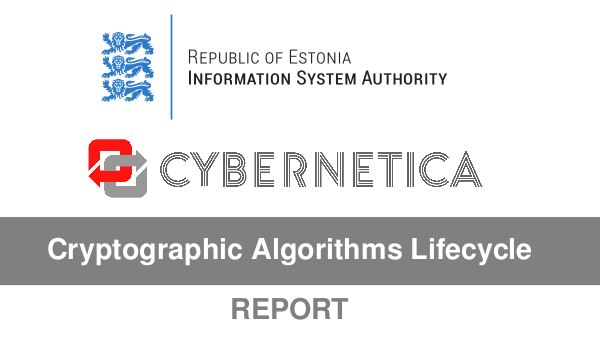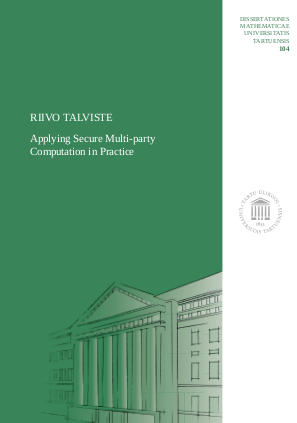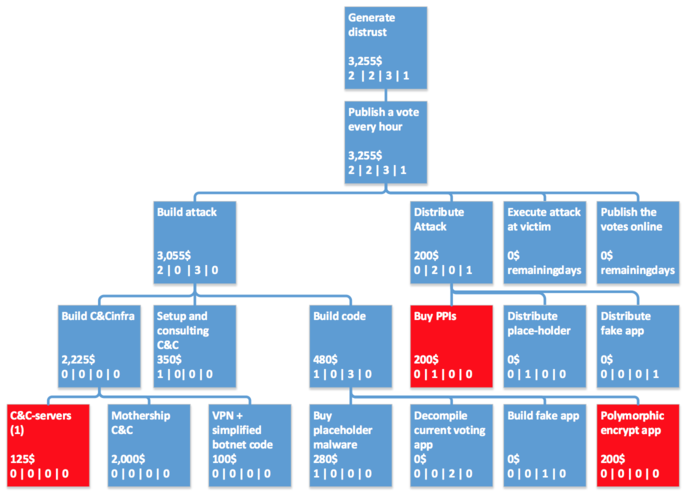The defences are taking place on the first and second week of June.
May 31 (online):
Time: 09:15
Student: Xuejun Wu (Computer Science MSc)
Title: Security in Remote Update of Medical Devices
Supervisor: Tuomas Aura, Arnis Paršovs
Reviewer: Denizalp Kapisiz
May 31 (online):
Time: 13:00
Student: Kert Tali (Computer Science BSc)
Title: Parallel and Cloud-Native Secure MultiParty Computation
Supervisor: Riivo Talviste, Pelle Jakovits
Reviewer: Eero VainikkoTime: 13:45
Student: Karl Hannes Veskus (Computer Science MSc)
Title: Privacy-preserving data synthesis using trusted execution environments
Supervisor: Liina Kamm, Sven Laur
Reviewer: Arnis Parsovs
June 3 (online):
Time: 11:45
Student: Geitrud Pank (Computer Science BSc)
Title: Lab Package: Mobile application security testing
Supervisor: Dietmar Pfahl, Hina Anwar
Reviewer: Alejandra Duque-Torres
June 3 (online):
Time: 10:30
Student: Olivier Levasseur (Cyber Security MSc)
Title: Model-Driven Engineering of Blockchain Oracles
Supervisor: Mubashar Iqbal, Raimundas Matulevičius
Reviewer: Vimal Kumar DwivediTime: 11:15
Student: Ekaterina Zhuchko (Cyber Security MSc)
Title: Formal Analysis of Non-Malleability for Commitment Schemes in EasyCrypt
Supervisor: Denis Firsov, Sven Laur
Reviewer: Peeter LaudTime: 12:00
Student: Sanam Nisar (Cyber Security MSc)
Title: Defining Blockchain-Based Techniques for Privacy Conflict-Resolution in CrossOrganizational Processes for E-Health Systems
Supervisor: Aleksandr Kormiltsyn, Alex Norta, Vimal Dwivedi
Reviewer:Time: 12:45
Student: Anel Abylkassymova (Cyber Security MSc)
Title: Machine Learning Method For Detecting Botnet Attacks Originated From The Iot Networks
Supervisor: Hayretdin Bahsi, Sven Nõmm, Raimundas Matulevicius
Reviewer: Risto VaarandiTime: 13:30
Student: Gediminas Milašius (Cyber Security MSc)
Title: Integration Analysis of Various eID Authentication Solutions Used in the Private Sector of Estonia
Supervisor: Arnis Paršovs
Reviewer: Kristjan KripsTime: 14:15
Student: Elizabete Liene Šterna (Cyber Security MSc)
Title: Security Architecture of the Latvian eParaksts mobile
Supervisor: Arnis Paršovs
Reviewer: Inguss Treiguts
June 7:
Time: 12:15
Student: Anna Shamritskaya (Innovation and Technology Management MSc)
Title: Information security assessment in a startup
Supervisor: Mari Seeba, Raimundas Matulevičius
Reviewer: Juliia TrabskajaTime: 9:15
Student: Anita Sarv (Computer Science BSc)
Title: Implementation of multifactor authentication in Bank of Estonia
Supervisor: Toomas Krips
Reviewer: Jürmo MehineTime: 10:45
Student: Mark Robin Kalder (Computer Science BSc)
Title: Bug bounty programs and ethical hacking
Supervisor: Alo Peets, Margus Niitsoo
Reviewer: Anne VillemsTime: 12:00
Student: Allan Alikas (Computer Science BSc)
Title: Privacy preserving anonymization software
Supervisor: Sulev Reisberg
Reviewer: Liina Kamm
June 8:
Time: 10:00
Student: Semjon Kravtšenko (Computer Science BSc)
Title: The Estonian Mobile-ID implementation on the SIM card
Supervisor: Arnis Paršovs
Reviewer: Jürgen Niinre
June 9:
Time: 13:00
Student: Kristjan Pühvel (Computer Science BSc)
Title: Password cracking and hashing functions on the example of UT accounts
Supervisor: Alo Peets
Reviewer: Kristjan Krips
June 10:
Time: 14:30
Student: Kalmer Keerup (Computer Science BSc)
Title: Implementation of an user access control respecting file server
Supervisor: Tarmo Oja, Heili Orav
Reviewer: Mart Oruaas
Links:
https://cs.ut.ee/sites/default/files/2022-06/Defence7.6.22.pdf
https://cs.ut.ee/sites/default/files/2022-06/Kaitsmine%2008.06.2022_0.pdf
https://cs.ut.ee/sites/default/files/2022-06/Kaitsmine%2010.06.2022_0.pdf



